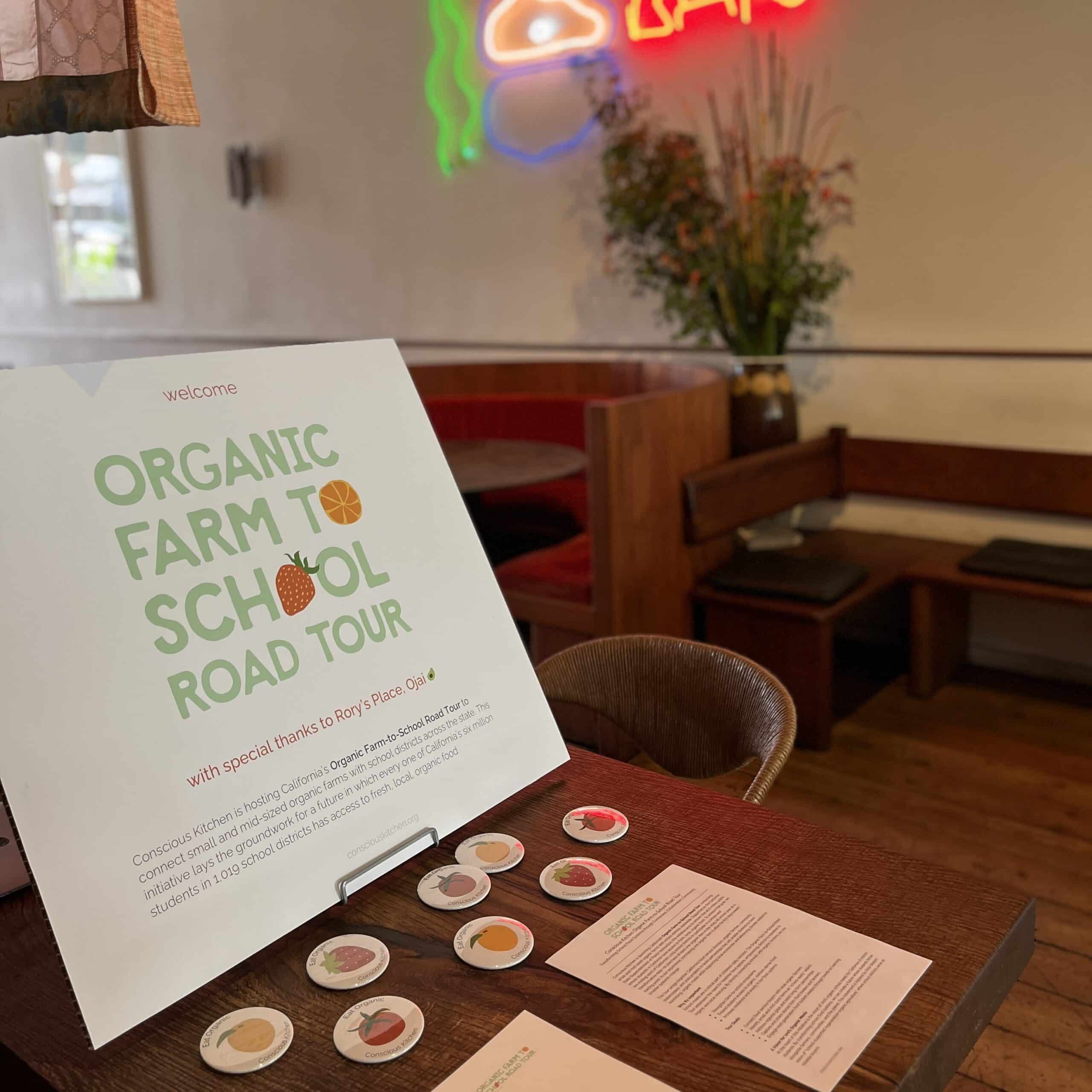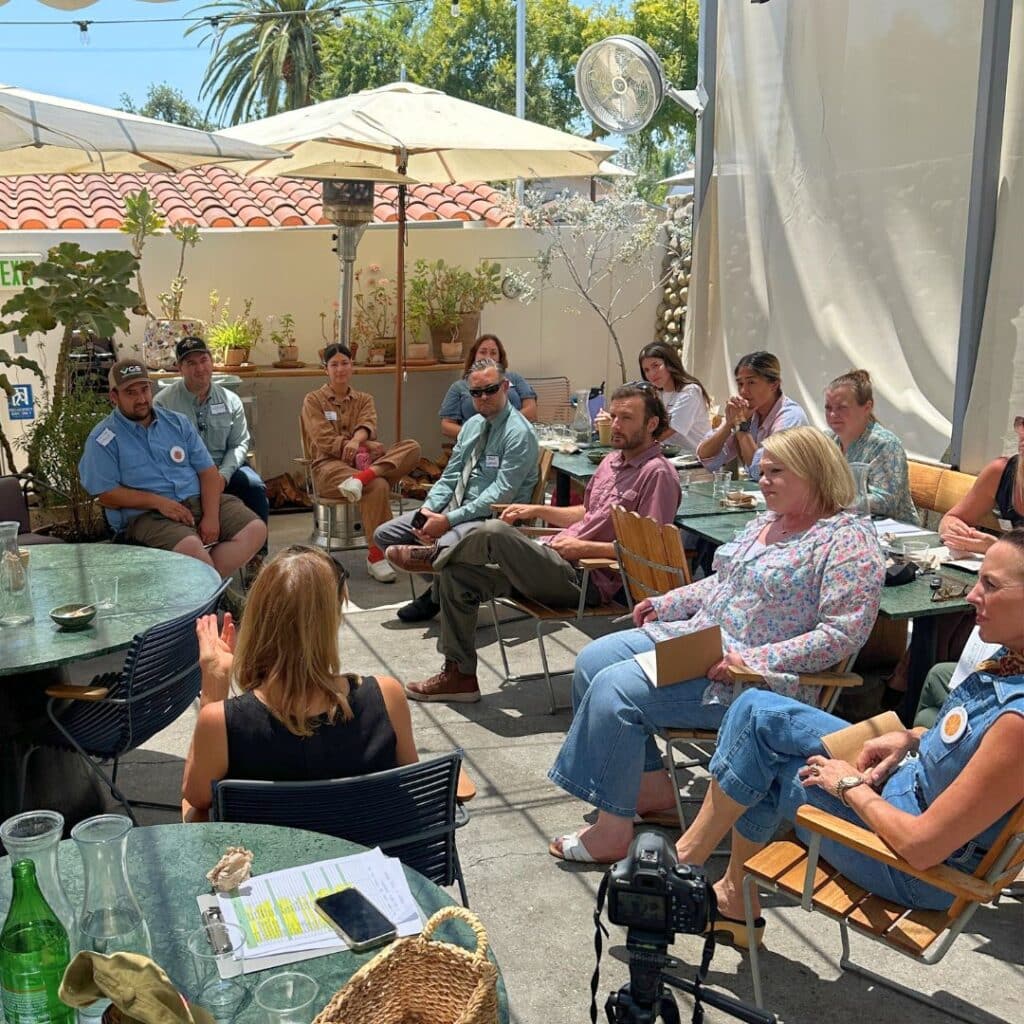During the summer of 2025, Conscious Kitchen set out on the Organic Farm-to-School Road Tour to connect small and mid-sized organic farms with school districts across California. With a vision of providing every student in the state with fresh, local, and organic food, this initiative invites school food service leaders, farmers, and community partners to come together, share stories, and explore how we can overcome the challenges in sourcing better food for our kids. Each stop on the tour is an opportunity to dive deeper into the issues at hand, learn from one another, and strengthen the partnerships that are shaping the future of school meals. Here’s a look at one of our recent gatherings on the road and the incredible conversations that are moving us toward a healthier, more sustainable food system for California’s students.
Road Tour Stop #4: Rory’s Place

Conscious Kitchen was thrilled to host our South Coast Road Tour gathering at Maeve McCauliffe’s restaurant, after our inspiring culinary workshop in Ventura County earlier this year. The event at Rory’s Place felt like a reunion of sorts. Our first visit to Southern California was a game changer, and returning to the region was a moment to reconnect with familiar faces and welcome new voices into the fold.
The intimate gathering allowed for deeper conversations and connections. It’s the people at the table that make these events so impactful — and we had the privilege of sitting down with farmers, food service directors, and community partners on the front lines of changing how we feed our students.
The Power of Connection

How can we move the needle toward getting more organic food into school meals? That question drove conversation, as farmers and food service leaders shared thoughts on the challenges and opportunities of organic food in schools. The group quickly rallied around a common theme: education. From farm tours to school gardens, the first step in bringing organic food to schools is helping students, parents, and teachers understand what they are eating and why it matters.
Alex Zadeh from AZ-Ranch suggested farm tours, farmer visits to schools, and farmer talks with parents to involve the community in the organic movement. Similarly, Nathan McCaulley of Apricot Lane Farm pushed for immersive experiences with produce, allowing students to compare organic to non-organic food and learn firsthand about the benefits of organic farming.
One after another, farmers, food service leaders, and community members shared their “dreams” for the future of school meals. Visions ranged from 100% regenerative organic food in cafeterias to seasonal outdoor family cooking nights. The passion in the room was undeniable!
Overcoming Challenges

Even while energized, there is no sugar-coating the barriers that stand in the way of scaling organic food in schools. One farmer addressed the difficulty of accessing the school food marketplace, navigating paperwork, and meeting certification requirements, while another pointed to transportation access and bureaucratic red tape as impediments.
Challenges are further compounded by budget and staffing issues that many food service directors face, as well as logistical issues like aggregation and lack of scratch kitchens. Chris Massa from CDFA spoke to the time and money constraints that make it difficult for schools to take on the extra work of sourcing organic food.
However, even amidst tough realities, there was a strong sense of optimism. Mike Roberts of Farmivore called for a more functioning farmer-food hub-school network, something that could streamline procurement and make it easier for schools to consistently access local organic foods. This idea resonated with many who see food hubs as a key solution for smaller farms that struggle with distribution.
Education and Understanding

Education remained a central theme of the day. Erin Hansen from Ventura Unified School District emphasized the need for both culinary and nutrition education that connects food with health outcomes, teaching students about food as medicine. Allison England from Ocean View School District highlighted the crucial role that school gardens play in nutrition education — and the need for more time to actually eat, more taste testing, and more farm tours to deepen students’ understanding of where their food comes from.
From changing the stigma around school food to creating a 100% organic system, a multi-faceted approach is essential in achieving the group’s vision. The path ahead requires collaboration, readiness to act, and alignment of the right partners and resources.
Alyssa Burgers from Oxnard Union High School District summed up the spirit of the day: “We need 100% organic food, community and staff buy-in, and student understanding of ‘why.’” Farm-to-school is not just about food; it’s about shifting widespread perceptions, embracing innovative approaches to education, and reimagining the role of schools in shaping our food systems.
The Road Ahead
With each stop of the Conscious Kitchen Road Tour, it’s clear that our collective work is making an impact. With passionate farmers, dedicated food service directors, and engaged community members working hand-in-hand, we’re on our way to bringing 100% organic food to every school in California… with renewed energy and determination!
